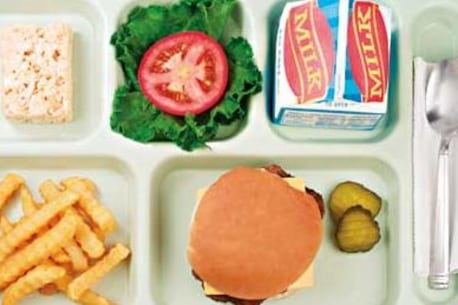One thousand pounds of ground beef in the freezer and a stockpile of foam food containers are helping one small Colorado district maintain a little piece of normalcy amid a pandemic.
“Just normal school lunch: Mac ’n’ cheese, goulash, mashed potatoes and gravy with a pork chop, chicken fingers with mashed potatoes and gravy, a hamburger,” said Lacreata Mease, food service director in the Limon district, as she rattled off some recent menu items. “I don’t know how else to cook.”
As school districts around the state announced extended closures, John McCleary, the superintendent of the 450-student Limon district on Colorado’s eastern plains, asked Mease to put in a big order.
“He said, ‘I think this is going to be a big deal. Do you think that we could get some food delivered, in case this turns out to be a big deal?’” she recalled weeks later. “So I went and ordered a lot of hamburger and diced chicken and pasta and stuff that we use every day.”
Those supplies have helped Mease and her small team to serve roughly 100 students the same types of hot meals she used to serve to 300 students a day when school was in session.
“We are just so grateful that our day is pretty normal in the midst of all this craziness,” she said.
It’s also allowed Mease to avoid some of the shortages that have bedeviled other school lunch programs during school closures. Many districts have switched to pre-packaged food items for grab-and-go lunches. They’re easy to assemble with a small crew, reducing exposure for workers, and they’re easier to keep at the right temperature for several hours. But once mundane items like pre-bagged baby carrots and granola bars are now in short supply.
“When I go to make my orders, there is no prepackaged hardly anything in the warehouse,” Mease said. “There are no cereal bars. There are no Uncrustables, whatever that is. I mean, I know what it is. I just can’t imagine that that is some child’s lunch, but it must be.”
Other Colorado districts have made the same discoveries. Facing dire shortages of sliced bread, Adams 12 Five Star Schools in suburban Denver also started serving hot lunches again. Cooking real food gives the district a lot more flexibility to work with what’s available, said chief operating officer Pat Hamilton.
“We make menu adjustments,” he said.
But there is one widespread shortage even Mease had to grapple with.
“The thing that panicked me the most was not being able to get sacks, because everybody wanted those paper sacks,” she said. “We didn’t run out, but we were down to the last few.”





